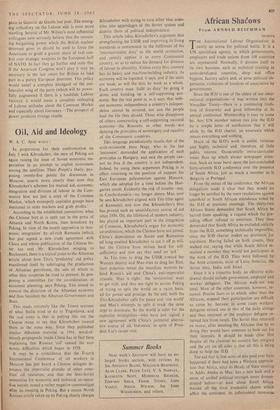Oil, Aid and Ideology W. A. C. ADIE writes :
in preparation for their confrontation on July 5 with Khrushchev, the men of Peking are again raising the issue of Soviet economic im-
perialism in an attempt to exploit restiveness among the satellites. Their People's Daily. pro-
posing twenty-five points for discussion in Moscow, asserts more clearly than ever that Khrushchev's schemes for mutual aid, economic integration and division of labour in the Com- munist bloc are just a copy of the Common Market, 'which monopoly capitalist groups have instituted to seize markets and grab profits.'
According to the established convention, what the Chinese hint at is spelt out in the press of Albania and North Korea, then broadcast by Peking. In view of the recent opposition to 'eco- nomic integration' by oil-rich Rumania (which has just signed a new trade agreement with China and whose publication of the Chinese let- ter has sent Mr. Khrushchev winging to Bucharest), there is a topical point to the Albanian article about how Tito's 'predatory' aid policy manifested itself by sabotaging the production of Albanian petroleum, the sale of which to other bloc countries he tried to prevent. In pro- posing a committee for the co-ordination of economic planning, says Peking, Tito aimed to control the direction of the Albanian economy and thus liquidate the Albanian 'Government and State.
This .reads curiously like the Titoist account of what Stalin tried to do to Yugoslavia, and the real irony is that in putting this out the Chinese mean to say that Khrushchev treated them in the same way. Since they published similar Albanian material in 1961, word-of- mouth propaganda inside China has in fact been explaining that Russian 'aid' caused the eco- nomic difficulties which began in 1958.
It may be a coincidence that the Fourth International Conference of oil workers in Moscow has just heard a Chinese delegate de- nounce the imperialist plunder of other coun- tries' oil resources, and that the Sino-Soviet committee for economic and technical co-opera- tion merely issued a rather negative communiqué after_ its meeting in Peking. But a recent North Korean article taken up by Peking clearly charges Khrushchev with trying to turn other bloc coun- tries into appendages of the Soviet system and deprive them of political independence.
This article takes Khrushchev's argument that strengthening the USSR and improving its living standards is tantamount to the fulfilment of his `internationalist duty' to the world revolution, and cannily applies it to every Communist country, so as to reduce his demand for division of labour to absurdity. Unless every bloc country has its heavy and machine-building industry, its economy will be lopsided, it says, and if the units are weak, so will the bloc be weak as a whole. Each country must 'fulfil its duty' by going it alone and building up a self-supporting eco- nomy. But the real point is, as it says, that with- out economic independence a country's indepen- dence cannot be ensured, nor can the people lead the life they should. Those who disapprove of others constructing a self-supporting national economy—the Russians, in other words—are denying the principles of sovereignty and equality of the Communist countries.
This language paradoxically recalls that of the arch-revisionist Imre Nagy, who in his last `testament' demanded the application of such principles to Hungary, and said the people can- not be free if the country is not independent. Indeed, by using these arguments Peking is in effect returning to the position of support for East European polycentrism against Moscow, which she adopted for a time before the Hun- garian revolt. Evidently the risk of trouble—say, in Czechoslovakia—no longer deters Mao now he sees Khrusitchev aligned with' Tito (that agent of Kennedy), and now that Khrushchev's bloc has proved such an unsatisfactory source of aid since 1956. Oil, the lifeblood of modern industry, has played an important part in the integration of Comecon, Khrushchev's organ for economic co-ordination, which the Chinese have not joined. China's dependence on . Soviet and Rumanian oil long enabled Khrushchev to cut it off at will, but the Chinese have striven hard for self- sufficiency and now say they need no 'aid.'
As Tito tries to drag the USSR toward her Western destiny and Mao tries to drag her East, their polemics reveal the mundane motives be- hind Russia's aid and China's anti-imperialist crusade. Mao is right: the 'revisionists' want to get rich; and they are right to accuse Peking of trying to split the world on a racist basis, all for power and prestige. In the end, both the Tito-Khrushchev calls for peace and 'one world' and Mao's attempts to split it mask the same urge to dominate. So the world is safer for the capitalist monopolies—who have just signed a new agreement with China's potential alterna- tive source of oil, Indonesia, in spite of Presi- dent Liu's recent visit.






























 Previous page
Previous page